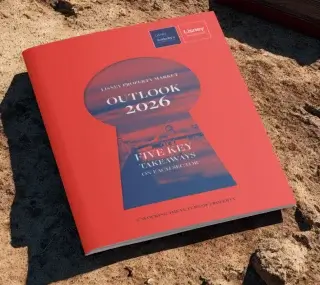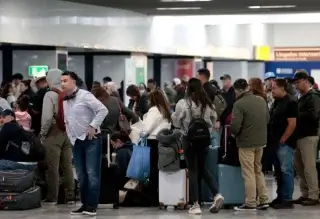read also
 Iceland’s Four-Day Workweek Five Years On
Iceland’s Four-Day Workweek Five Years On
 Mortgage Approvals in Ireland Slump Sharply in January
Mortgage Approvals in Ireland Slump Sharply in January
 Lisney Property Market Outlook: Irish Property Market Poised for Steady Growth in 2026
Lisney Property Market Outlook: Irish Property Market Poised for Steady Growth in 2026
 Inflation in Romania Slows to 9.6% but Remains Above Forecast
Inflation in Romania Slows to 9.6% but Remains Above Forecast
 Riots in Mexico Disrupt Air Links to Resort Destinations
Riots in Mexico Disrupt Air Links to Resort Destinations
 UK House Prices Stabilise After 2025 Slowdown
UK House Prices Stabilise After 2025 Slowdown
Tourism & hospitality / Analytics / Reviews / Netherlands / Spain / Portugal / Greece / United Kingdom / France 15.03.2025
Which Countries Increased Tourist Taxes in 2025?

Many countries are introducing new taxes for foreign visitors or raising existing rates as a strategy to combat overtourism and generate revenue for infrastructure improvements. Governments are also paying closer attention to the short-term rental market, tightening regulations for property owners. According to Forbes report, these trends are particularly strong in European nations.
Netherlands
Amsterdam is leading the way in increasing tourist taxes. The city has introduced a 12.5% lodging tax, making it one of the highest in Europe. Additionally, cruise ship passengers must now pay €14.50 per person, and permits for new hotel construction in key areas have been frozen. Large tourist buses over 7.5 tons are now banned from entering the city center.
These measures are part of a broader sustainable development plan aimed at reducing CO₂ emissions and curbing overcrowding. Amsterdam also plans to switch to zero-emission tour boats for canal cruises.
Italy
Venice, struggling with over-tourism, introduced a €5 entry fee in 2024. In 2025, this rate increased to €10 for visitors who fail to prepay at least four days before arrival. Additionally, the number of days when the tax is applicable has expanded from 1 to 54, including weekends. These policies have already generated €2.2 million in revenue and aim to alleviate pressure on the city’s tourism infrastructure.
Venetian authorities have also tightened regulations on short-term rentals, limiting many property owners to 120 rental days per year.
In Pompeii, another major tourist hotspot, visitor limits were introduced after 4 million people visited in 2024. The archaeological park now restricts daily entries to 20,000 people, with morning access limited to 15,000 and afternoon slots capped at 5,000 between April 1 and October 31, 2025. Additionally, advance online booking is now mandatory, with tickets tied to specific names and time slots.
Italy also imposes tourist taxes in most major cities:
- Rome: €3-€7 per night
- Milan: €2-€5
- Florence: €1-€5
Greece
Greece has introduced a climate resilience tax, ranging from €1.50 for 1-star hotels to €15 for 5-star accommodations during peak season. In 2023, the highest-category hotels only paid €5. Off-season rates will be lower to promote year-round tourism.
Additionally, Greece will charge €20 per cruise passenger visiting Mykonos and Santorini during peak summer months. In 2024, Mykonos alone hosted 1.29 million cruise passengers from 768 ships, overwhelming an island with a permanent population of only 10,000 people.
In Athens, a new ban on short-term rental licenses in three central districts took effect on January 1, 2025. Announced by Tourism Minister Olga Kefalogianni, this move aims to combat housing shortages and ease strain on infrastructure. The restriction may extend beyond the initial one-year period.
United Kingdom
The UK is modernizing its border system with the Electronic Travel Authorization (ETA) program.
- From January 8, 2025, visitors from non-EU countries will require an ETA.
- From April 2, 2025, this requirement extends to European tourists.
The £10 (€12) digital permit allows multiple entries for up to six months over two years, effectively functioning as a tourist tax. This initiative enhances security and streamlines travel for millions of visitors annually.
Additionally, the Visitor Levy (2024) law grants Scottish councils the authority to set local tourist taxes. While no official charges have been implemented yet, Edinburgh and Highland councils have proposed a 5% accommodation tax, which could come into effect in 2025. Wales is also considering a similar measure.
Portugal
According to LUSA (Portuguese News Agency), 40 out of 308 municipalities in Portugal now levy a tourist tax.
- Lisbon doubled its nightly tourist tax to €4 per person as of January 1, 2025. The €2 cruise arrival fee remains unchanged.
- Porto also raised its tax to €3 per night per person.
On Madeira, new hiking fees apply from January 1, 2025. Tourists must now pay €3 to access any of the 30 official trails, whereas previously, only seven routes were subject to fees. Visitors who fail to comply may face a €50 fine. The government aims to protect the island’s landscapes and enhance the hiking experience.
Spain
Spain has some of the highest tourist taxes in Europe, particularly in Catalonia.
- Cruise passengers arriving in Barcelona must now pay €6.25 per person.
- Luxury hotel guests face a €7 per night tax (up from €3.50 in 2024).
- Hostel stays are taxed at €2 per night (previously €1).
- Short-term rental guests now pay €4 per night instead of €2.
In 2025, Barcelona plans to increase its tourist tax to €15 per night, making it the highest in Europe. This measure aims to address overcrowding and rising rental costs, with some funds directed toward housing policies. Additionally, all Catalonian municipalities can now levy an additional €4 municipal tax, which previously only applied to Barcelona.
On the Balearic Islands, visitors must pay an eco-tax ranging from €1 to €4 per night.
The Canary Islands currently charge €0.15 per visitor in the town of Mogán, but regional authorities are considering broader implementation.
France
France’s tourist tax rates vary depending on accommodation type and location.
National and regional levies combined range from €1.95 per night in campsites to €15.60 in luxury hotels. These taxes aim to fund infrastructure and promote sustainable tourism.
Thailand
By the end of 2025, Thailand plans to introduce a new foreign tourist tax of 300 baht (~$9).
- Air travelers must pay the fee for each entry.
- Land and sea arrivals will only pay once per visit, with free re-entry for 30-60 days.
Authorities believe the tax will not deter visitors but will help manage tourism impacts and fund infrastructure maintenance.
Bali
Bali is considering a daily tourist tax inspired by Bhutan’s Sustainable Development Fee (€100 per day).
This move comes amid growing concerns over overtourism, traffic congestion, and illegal land development.
Authorities have already shut down illegal resorts, such as the Russian-owned PARQ Ubud, which was constructed without permits on agricultural land. The owner was arrested, and development was halted.
In 2023, Bali also considered banning motorbike rentals for tourists to reduce traffic accidents. A moratorium on new hotels, villas, and nightclubs was introduced in overdeveloped areas.
Conclusion
Rising tourism taxes have become a key tool for managing overtourism, environmental degradation, and housing crises in popular destinations worldwide. While these measures provide economic benefits, they also increase travel costs and could impact tourism investment potential.
As more governments implement restrictions, the trend toward sustainable tourism management is likely to expand in the coming years.


